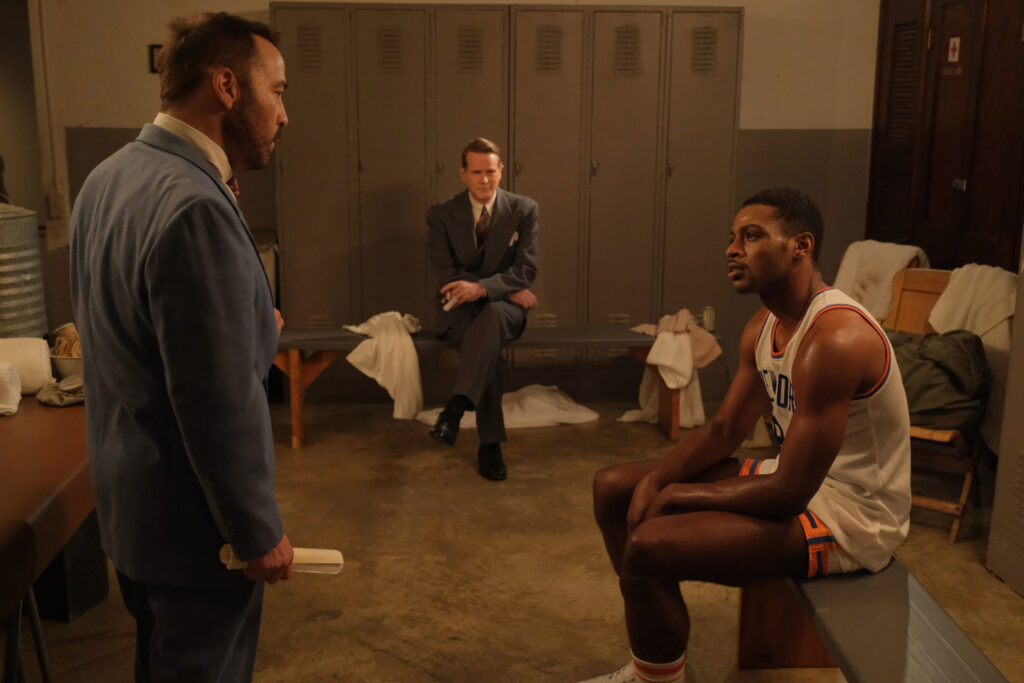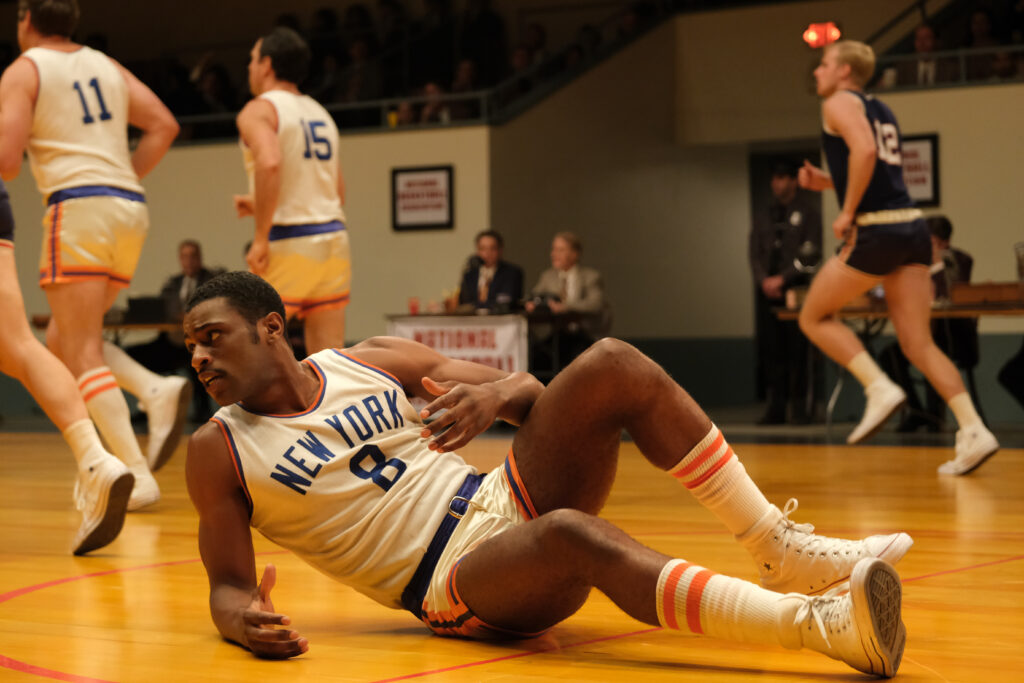July 4, 2023
by Carla Hay

Directed by Alejandro Monteverde
Some language in Spanish with subtitles
Culture Representation: Taking place in the United States, Mexico, Honduras and Colombia, the dramatic film “Sound of Freedom” (inspired by true events) features a white and Latino cast of characters representing the working-class, middle-class and wealthy.
Culture Clash: An American crusader, whose mission is to fight child sex trafficking, quits his job as a special agent for the Department of Homeland Security so that he can rescue a Honduran who has been kidnapped and sold into sex enslavement.
Culture Audience: “Sound of Freedom” will appeal primarily to people who are interested in watching inspiring dramatic portrayals of true stories about justice.

“Sound of Freedom” is one of several faith-based movies that are about rescuing people from sex trafficking and sex enslavement. This dramatic film, which is based on real people and true events, benefits from having a talented cast and solid direction. Some of the dialogue is corny, and some of the acting is clunky, but the movie’s intentions are in the right places. “Sound of Freedom” goes all-in with the tearjerking aspects of this drama about child sex-trafficking. The religious preaching is kept to a minimum: “God’s children are not for sale” is repeated almost like a slogan in the movie, but that’s as far as the preachiness goes.
Directed by Alejandro Monteverde (who co-wrote the “Sound of Freedom” screenplay with Rod Barr), “Sound of Freedom” begins in Honduras at the modest home of the Aguilar family. It’s where a single father named Roberto Aguilar (played by José Zúñiga) lives with his two children: daughter Rocio Aguilar (played by Cristal Aparicio) is about 11 or 12 years old, while son Miguel Aguilar (played by Lucás Ávila) is 8 years old. The movie opens with Rocio opening the door for a woman who identifies herself as a modeling scout named Giselle (played by Yessica Borroto, also known as Yessica Borroto Perryman), who has met this family before.
Giselle’s meeting with the family is not depicted in the movie, but her conversation with the family indicates that she approached the family when she saw Rocio singing in a market. Giselle has arrived at the home to take the family to the place where Giselle says auditions are being held for a modeling contest that could make Rocio famous. Giselle encourages Miguel to go to the auditions too.
Roberto is a simple and trusting man who doesn’t notice some of the warning signs when they arrive at the “audition place.” It’s a dark and dingy motel. And when they get to the closed room where the “auditions” will take place, Giselle tells Roberto that he can’t go in the room because “no parents are allowed.” Roberto willingly obliges and leaves Rocio and Miguel with Giselle. It’s a big mistake that leads to a heartbreaking nightmare for the family.
Giselle goes through the motions with the 10 to 15 children who are gathered in the room. All of the children are under the age of 16. Giselle teaches them how to pose for modeling photos. The children are photographed in several modeling poses. Rocio has makeup put on her for these photos.
Not long after these photo sessions, the terror starts for these innocent children. They are kidnapped, thrown into a van, and transported to a remote warehouse, where a disgusting pedophile chooses Rocio to purchase for sex enslavement. Rocio fights against leaving Miguel behind, but she is overpowered by the adults. Miguel will soon suffer the same fate of being sold into sex enslavement.
Meanwhile, when Roberto sees that Giselle has not returned to the home with his children by nightfall, he goes back to the motel where he left the children. To his horror, Roberto sees that the motel room is abandoned. He frantically pounds on other doors in the motel hallway. But, of course, he can’t find his children because they’ve been kidnapped.
This scene looks a little phony because the motel is completely deserted, with no employees or guests in sight. And when Miguel runs out into the deserted street, it looks more like a movie set than a real street. It’s a minor flaw but indicative of how “Sound of Freedom” has some very overly staged scenes that don’t ruin the movie but just unnecessarily add to the melodrama.
Meanwhile, a special agent for the Department of Homeland Security named Timothy “Tim” Ballard (played by Jim Caviezel) has been working in the sex-trafficking unit. His job is to arrest the pedophiles and other people involved in child sex trafficking. Tim has a co-worker named Chris (played by Scott Haze), who soon says that he is quitting the job because it’s become too heartbreaking and stressful for him.
Tim considers himself to be a moral crusader who will stop at nothing to bring these perverted criminals to justice. The movie has a somewhat long segment showing how Tim operates. After a sleazy-looking pedophile, whose name is Oshinsky (played by Kris Avedisian), has been arrested, Tim pretends to be a secret pedophile who happens to be a Homeland Security agent.
Tim approaches Oshinsky in jail. He tells Oshinsky that that they have the same pedophile interests and that he can help Oshisnky get more lenient punishment. At first, Oshisnsky is suspicious of Tim, but Tim is able to win Oshinsky’s trust. It’s all a ruse so that Oshinsky can reveal information about the secret pedophile network that Oskinsky has been a part of and which still operates. The ruse works, and Oshinsky is booked with more charges, based on the information that he gave to Tim.
It isn’t long before Tim finds out about kidnapped and separated siblings Miguel and Rocio. Tim meets Miguel first, after an American pedophile was busted for trying to take Miguel over the U.S./Mexico border and pretending that Miguel was his nephew. During his sex enslavement, Miguel was renamed Teddy Bear and ordered to tell people an alias if people asked Miguel what his name is.
When Tim meets a terrified Miguel, at first, Miguel gives Tim a fake name. Eventually, when Miguel sees that Tim is a law enforcement agent who can be trusted, he tells Tim his real name. Tim is deeply moved by Miguel and takes him to a diner, where Miguel tells the rest of his story about the kidnapping and how he’s trying to find his sister Rocio.
Miguel begins to open up to Tim because Miguel has a small dog-tag-styled necklace with the named Timoteo (the Spanish word for Timothy) on it. It’s a necklace that Rocio gave to Miguel before they were separated. On the necklace’s pendant, there’s a scripture reference from 1 Timothy 6:11 and the words “Man of God” inscribed on it.
By sheer coincidence, the man who rescued Miguel is also named Timothy. In the movie, Miguel sees it as a sign that he can trust Tim, so he gives this necklace to Tim and asks him to give it to Rocio if Tim ever finds her. According to the website of Operation Underground Railroad, the non-profit advocacy group founded by the real Tim Ballard, this necklace really was given to him by a boy he rescued from sex trafficking.
In the movie, Miguel soon reunites with his father Roberto, who is grateful that Miguel has been found but devastated by what his kids experienced and frantic about Rocio still being missing. Miguel and Tim have a brief, heart-to-heart conversation about being fathers. (Tim is the father of about six or seven kids.) It’s at that point that Tim vows to help find Rocio, arrest the people involved in her sex enslavement, and reunite her with her family.
The rest of “Sound of Freedom” shows Tim on this mission when he finds out that Rocio is being held in Colombia. At first, he gets a reluctant go-ahead from his supervisor John Bryant (played by Kurt Fuller), who reminds Tim that the main focus of Tim’s job should be arresting the pedophiles, not rescuing the child victims of sex trafficking. When Tim’s quest to find Rocio begins to consume him and take time away from his other work duties, he decides to quit his Homeland Security job to focus full-time on rescuing sex-trafficking victims, beginning with Rocio.
Mira Sorvino has a supporting role as Katherine Ballard, Tim’s wife, who agrees with Tim’s decision. Unfortunately, “Sound of Freedom” is one of those movies where women are either portrayed as saintly or villainous. It’s not completely sexist, but it’s problematic since all of the rescuers in the movie are men. Where are the women who are supposed to be part of the team? Women are usually the ones who provide the post-rescue counseling of trafficking victims, but that’s not depicted in this movie.
Along the way, Tim makes some valuable contacts who show him how to go undercover to infiltrate these perverted networks. A scruffy, middle-aged man nicknamed Vampiro (played by Bill Camp) is Tim’s chief mentor. Through Vampiro, Tim meets Jorge (played by Javier Godino), who accompanies Tim in the Colombian jungle during the search for Rocio.
Another ally is Paul (played by Eduardo Verástegui), who poses as a wealthy pedophile who wants to build a hotel that will be a front for a sex-trafficking business. This “sex-trafficking hotel” concept is not completely unrealistic, because there are several business in real life that are fronts for sex trafficking. But the way this “sex-trafficking hotel” is described in the movie is somewhat awkward and unconvincing.
Vampiro has his own story of why he got involved in busting pedophiles and other people who commit child sex abuse. He tells Tim that during the days when he would abuse drugs and alcohol, he had sex with a prostitute whom he thought was an adult. After they had sex, he found out that she was 14 years old. Vampiro felt so guilty about what he had done, he attempted suicide. Vampiro then made it his life purpose to rescue people, especially children, from sex trafficking and to bring the perpetrators to justice.
Many of the people portrayed in “Sound of Freedom” are stereotypical and have the performances to match these rote characters. However, Ávila and Aparicio, who portray siblings Miguel and Rocio, are notable for their believable performances of innocence violated. Ávila and Aparicio have wonderfully expressive faces that will make viewers really feel the emotions that Miguel and Rocio are experiencing. They are the reasons why many viewers will cry while watching “Sound of Freedom.”
Caviezel has portrayed heroic types before, but “Sound of Freedom” has a deeper resonance because of the subject matter. He gives a very good performance, but it’s not the type of performance that’s going to win major awards. At the end of the film, Caviezel is shown giving an emotional and heartfelt message for viewers as a call to action to help stop human trafficking. He also graciously mentions that the real heroes of the story are the children and other people who survive this horrific abuse.
Angel Studios released “Sound of Freedom” in U.S. cinemas on July 4, 2023.


